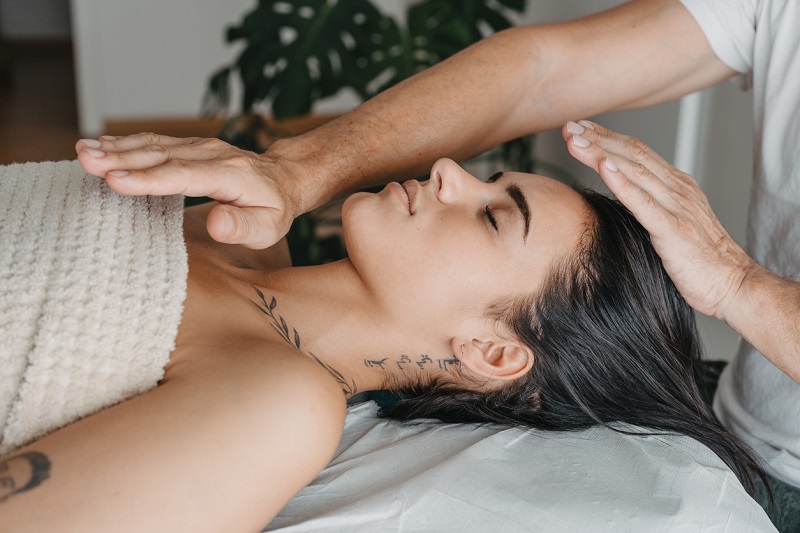What is Reiki and How Can It Benefit You?

April 19, 2024
We’ve all walked into a room where the energy seemed to immediately lift because of someone with an open, positive outlook. The ancient practice of Reiki taps into that same type of intangible energy, calming people and offering a variety of physical and psychological benefits.
Derived from the Japanese words “rei,” meaning “God’s wisdom or the higher power,” and “ki,” meaning “life force energy,” Reiki is a type of energy healing that’s believed to improve the flow of energy around the body. It’s practiced across the world and is increasingly being offered to patients in hospital settings, says Marissa Winters, MA, RDN, a reiki master and board-certified health and wellness coach at Jersey Shore University Medical Center.
“Sometimes, our energy gets out of balance,” Winters says. “Reiki helps settle you and put your energy back into balance. You can see things from a different perspective and notice options you may have missed when you were focused on emotions like anger, frustration or sadness.”
Elements of a Reiki Session
Typically provided in a peaceful setting, Reiki can be performed by a practitioner or self-administered (after someone is trained). The practice involves placing hands on or over specific areas of the body and remaining there for several minutes. Through these motions, Reiki is believed to channel a universal form of energy known as “ki” and pronounced “key.”
Winters does her part to set the tone for sessions by “creating a container that’s as calm and supportive as I can make it. It’s not my energy—the energy is coming through me and has its own intelligence,” she explains. “It sounds very ‘woo-woo,’ but it affects people to the extent that they’re open to receiving it.”
Reiki Benefits
An ongoing pilot study spearheaded by Winters among Jersey Shore staff members in late 2020 has shown that a series of 15-minute Reiki sessions led to a 60 percent average reduction in participants’ self-reported stress levels.
Additionally, Winters says many studies have suggested that Reiki can:
- Enable relaxation
- Reduce anxiety and stress
- Ease pain
- Aid healing
- Improve symptoms of illness
“Reiki doesn’t cure anything, but it offers you access to your own healing capability and tranquil state,” says Winters. “Your energy comes to that level of peacefulness, serenity or comfort. Maybe you can’t get to complete zen, but you can feel better.”
Is Reiki for You?
Thinking of trying Reiki? Although some people are skeptical, Winters says the practice is becoming increasingly accepted as more research emerges about the mind-body connection. And Reiki can’t hurt. According to the National Center for Complementary and Integrative Health (NCCIH), Reiki causes no harmful effects, and there are no medical conditions that stand in the way of its use.
If you’re on the fence, Winters suggests:
- Do some research. Winters recommends perusing scientific studies about Reiki’s effects using the National Institutes of Health’s search engine.
- Suspend disbelief. “Reiki is experiential, so you can describe it,” she says, “but at the end of the day, you have to feel it. You have to be willing to see what it’s about.”
Next Steps & Resources
- To make an appointment with an integrative health specialist near you, call 800-822-8905 or visit our website.
- Learn more about Integrative Health & Medicine at Hackensack Meridian Health.
The material provided through HealthU is intended to be used as general information only and should not replace the advice of your physician. Always consult your physician for individual care.






